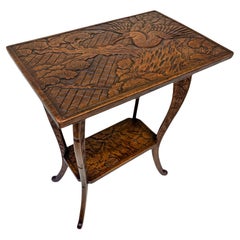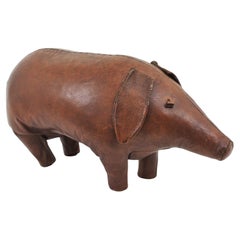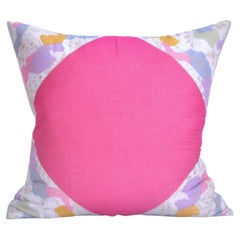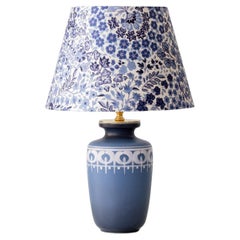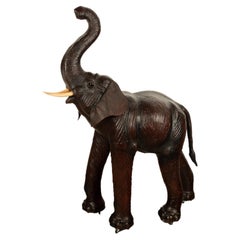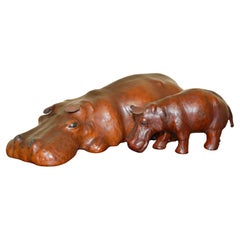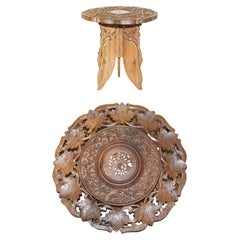Liberty of London
The Liberty of London department store, located in the fashionable west end of London in the United Kingdom, has been selling luxury items since 1875. From leather footstools in the shape of a hippo to elegantly hand-carved Moroccan coffee tables, there’s something to please every discerning collector. And while it became a reputable retailer over time, the original Liberty & Co. was a pivotal force in the development of the Aesthetic, Art Nouveau and the Arts and Crafts movements. As the champion of eclectic design throughout the centuries, Liberty continues to collaborate with designers to produce covetable interior fashion and accessories.
Arthur Liberty was born in 1843 in Buckinghamshire, England. His father, a draper, encouraged him to apprentice as a draper at age 16. Instead, he took an offer to work at Farmer and Rogers, a women’s fashion store. After ten years, he decided to strike out on his own. In 1875 he borrowed money from his father-in-law and leased a small store on the very prominent Regent Street, naming it the East India House.
Liberty’s store was very eclectic. It served as an emporium for Eastern imports, with a wildly varied collection of ornaments, fabrics and objects d’art — including imported antiques — on offer. In London, there was already a demand for and an interest in imported goods from India and elsewhere, so his business concept was an immediate success. He repaid his loan in less than two years and continually expanded by buying up all the buildings on his side of the street. His company was so successful that even the original Victoria and Albert Museum purchased Eastern textiles for its collection from his store.
By 1890, the firm came to be known as Liberty & Company. Liberty died in 1917, but the business continued to thrive. In 1924, the current iteration — and now world-famous — of the store was constructed. It was built in the Tudor Revival style and the structure's frame was made of wood salvaged from two British warships. In the 1950s and '60s, the store, now known as Liberty’s, helped spark the counterculture youth movements of the era as beatniks and hippies purchased fabrics and furnishings from this iconic store.
On 1stDibs, find antique Liberty of London tables, decorative objects, seating and more.
| Average Sold Price |
| $1,267 |
| Styles |
| Materials |
| Related Creators |
Early 1900s British Arts and Crafts Antique Liberty of London
Fruitwood
Mid-20th Century British Mid-Century Modern Liberty of London
Leather
Late 20th Century English Liberty of London
Linen, Cotton
1970s Dutch Arts and Crafts Vintage Liberty of London
Brass
1930s English Art Deco Vintage Liberty of London
Leather
1930s European Art Deco Vintage Liberty of London
Leather
1940s European Art Deco Vintage Liberty of London
Leather
19th Century Burmese Victorian Antique Liberty of London
Hardwood
Liberty of London Sale Prices
| Sold Date | Sold Price | Category | Material | Creation Year | |||||||||||||||||||||
|
| $1,267 |
Average sold price of items in the past 12 months |
| $127-$3,073 |
| Sold price range of items in the past 12 months |
Creators Similar to Liberty of London
Liberty Of London furniture for sale on 1stDibs.
- 1stDibs ExpertMay 30, 2024With respect to the British company called Liberty, where the furniture is made varies. Long before Liberty became one of London’s most iconic luxury department stores, 19th-century shoppers knew it as Liberty & Co. — purveyors of fine silverware designed in the Art Nouveau style, Arts and Crafts-style furniture and an eclectic assortment of ornaments, fabrics, fashion and other goods from around the world. Liberty & Co. also had a furniture workshop in Archway, London, run by Lawrence Turner and which employed carpenters to produce handcrafted, Arts and Crafts-style armchairs, stools, bookcases, cabinets, side tables and other furniture. In addition to their own in-house creations, Liberty & Co. also sold furniture by other designers, including chairs by German architect Richard Riemerschmid. Find Liberty of London furniture on 1stDibs.
- Is Liberty of London worth it?1 Answer1stDibs ExpertSeptember 27, 2024Yes, many furniture lovers believe that Liberty of London is worth it. The Liberty of London department store, located in the fashionable West End of London in the United Kingdom, has been selling luxury items since 1875. From leather footstools in the shape of a hippo to elegantly hand-carved Moroccan coffee tables, there’s something to please every discerning collector. The original Liberty & Co. was a pivotal force in the development of the Aesthetic, Art Nouveau and Arts and Crafts movements. As an enduring champion of eclectic design, Liberty continues to collaborate with designers to produce covetable interior pieces and accessories. However, whether or not it’s worth investing in Liberty of London furniture is totally subjective! At 1stDibs, we believe in buying what you love. Our shopping experience enables discovery and learning, whether you are a seasoned connoisseur or just beginning your collection. Find a range of Liberty of London furniture on 1stDibs.
- What is a Liberty print?1 Answer1stDibs ExpertFebruary 27, 2024A Liberty print is a pattern featured on fabrics made by the British company Liberty Fabrics. More than 45,000 of these prints have been unveiled since the founding of the brand in 1875. The company was initially called Liberty & Co. before the world came to know it as Liberty of London. Although they vary, Liberty prints typically share some similar characteristics, such as featuring natural motifs like flowers and leaves, flowing curved lines and patterning all over. Find a collection of vintage Liberty fabrics and furniture on 1stDibs.
- 1stDibs ExpertMarch 15, 2024To identify Liberty furniture, check discreet areas for a maker's mark. Most Liberty pieces feature a diamond-shaped tag made of ivorine or enameled brass that bears the Liberty name. Early pieces may feature a red or white paper label, while furnishings from select lines may feature an oval-shaped brass tag with the model and maker names. If you need help determining if a particular piece is a Liberty, a certified appraiser or knowledgeable antiques dealer can assist you. On 1stDibs, explore a variety of Liberty furniture.
- Where is Liberty fabric made?1 Answer1stDibs ExpertApril 5, 2024Liberty fabrics are made near Lake Como, Italy. Every Liberty fabric begins with a pattern hand-drawn by in-house designers located in London. A team of skilled technicians oversees the production of the fabric, and Liberty Fabrics unveils around 150 new materials each year. On 1stDibs, shop an assortment of Liberty of London pieces.
- Is Liberty furniture solid wood?1 Answer1stDibs ExpertMay 30, 2024The best known Liberty furniture is made of solid wood. Long before Liberty became one of London’s most iconic luxury department stores, 19th-century shoppers knew it as Liberty & Co. — purveyors of fine silverware designed in the Art Nouveau style, Arts and Crafts-style furniture and an eclectic assortment of ornaments, fabrics, fashion and other goods from around the world. Liberty & Co. also had a furniture workshop in Archway, London, run by Lawrence Turner and which employed carpenters to produce handcrafted, Arts and Crafts-style armchairs, stools, bookcases, cabinets, side tables and other furniture. Most of these high-quality and durable pieces were indeed made of solid wood such as oak, mahogany and walnut. In addition to their own in-house creations, Liberty & Co. also sold furniture by other designers, including chairs by German architect Richard Riemerschmid. Find antique Liberty & Co. furniture on 1stDibs.
- What is a London blue topaz?1 Answer1stDibs ExpertFebruary 22, 2021London blue topaz is actually not from London. London refers to a specific shade of blue that London blue topaz bears. It's lighter than aquamarine but darker than a rich sapphire stone.
- 1stDibs ExpertApril 5, 2022Peter Max's connection to the Statue of Liberty is that he created multiple paintings of the famous landmark. He made the first one for America's Bicentennial on July 4, 1976. You can shop a range of Peter Max art on 1stDibs.
- Is Links of London real silver?1 Answer1stDibs ExpertMay 30, 2024Yes, Links of London is real silver. Keep in mind that this doesn't mean its pieces are solid silver. The British maker produces many items out of sterling silver, which consists of 92.5% pure silver and 7.5% copper and other base metals. Find a variety of Links of London jewelry on 1stDibs.
- Is Yoko London real pearls?1 Answer1stDibs ExpertAugust 29, 2024Yes, Yoko London is real pearls. The British luxury fashion house uses cultured freshwater pearls in its jewelry. Cultured pearls are real pearls that come from mollusks, but humans assist in the development process. Since naturally occurring pearls are very rare, most fine pearl jewelry features cultured pearls. Explore a collection of Yoko London pearl jewelry on 1stDibs.
- 1stDibs ExpertApril 5, 2022The font used on London street signs is usually Univers Bold Condensed. However, local councils have the freedom to choose their own fonts, so you may see variations from the usual typeface in some places. You'll find a large collection of typographic art on 1stDibs.
- 1stDibs ExpertJanuary 27, 2025Several famous artists’ first exhibitions were held in London. Among the best-known is Damien Hirst, whose first exhibition, a group show called "Freeze," was held in a vacant London warehouse in 1988. Other notable artists whose first solo exhibitions were held in London include KAWS, Tracey Emin, Lauren Halsey, Mire Lee, Firelei Báez, Dominic Chambers, Krysia Nowak and Anthony Caro. Shop a collection of contemporary art on 1stDibs.
